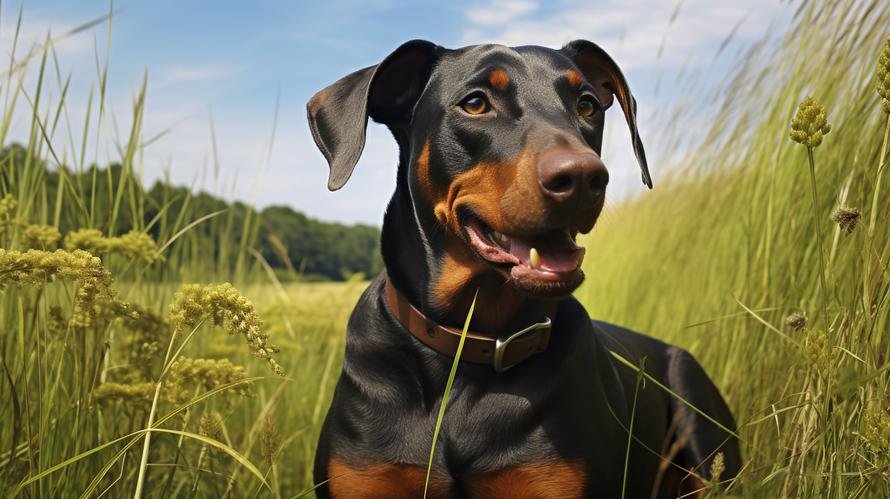Let’s play a little exercise. Close your eyes for a moment and imagine a Doberman Pinscher. What’s the first image that comes to your mind? A sleek, muscular dog with an imposing stance, piercing gaze, and a noble aura? If that’s the case, you’re right on point. Dobermans are quite the sight to behold. They combine strength, endurance, speed, and a regal look into one unique package. Now, open your eyes and make that clear gaze a part of your reality. Are you thinking of bringing home a Doberman Pinscher? Well, there is one question you’d surely want the answer to. How easy is a Doberman Pinscher to train?
You might be intrigued to know that Dobermans were originally bred around the 1890s by a German tax collector named Louis Dobermann. Reportedly, he aimed at creating an ideal protector dog breed which could accompany him during his risky tax collection tasks. Thus, Dobermans were bred to be intelligent, loyal, and protective, traits that make them excellent watchdogs and police dogs today.
Given their intelligence, you might want to assume that Dobermans are an easy breed to train. But, some of you may have heard tales about their stubbornness and temperament. So, the question remains, are Dobermans easy to train? Well, the answer is both, yes and no. It’s like baking a cake, the complexity of which depends on the type of cake you’re baking and your understanding of the recipe! How effective Doberman training will be, greatly hinges on the approach you employ.
Dobermans are indeed one of the smartest breeds out there, ranking 5th in Stanley Coren’s ‘The Intelligence of Dogs’. This certainly infers them being highly trainable. However, like all smart children, they do not merely want to follow orders. Dobermans wish to understand the purpose, find logic, and, if possible, negotiate. They yearn to participate in the process rather than being mere order-takers.
So, if you’re ready to transform your domineering Doberman dreams into reality, here’s a look at your recipe for success!
1. Start Early
Commence training your Doberman puppy as early as possible. This doesn’t mean implementing strict obedience training from day one. Focus first on socializing them, introducing them to various environments, people, noises, and other animals. This early socialization will help in shaping their temperaments, reducing their anxiety, and making them comfortable around others. When you start actual obedience training, make sure your young Doberman has assimilated a positive outlook towards new experiences.
2. Positive Reinforcement
Like us humans, dogs respond favourably to positivity. Positive reinforcement refers to rewarding good behaviour, which can motivate your Doberman to repeat it. The reward can take different forms, be it treats, praises, or extra playtime. Now, this doesn’t mean you shower them with treats for every little thing they do right. Balance is the key. Moreover, with time, you can gradually decrease the frequency of treats and replace them with praises and petting.
3. Establish Yourself As The Alpha
In the wild, dogs are pack animals. Every group has a leader, an ‘alpha,’ who makes decisions for the whole pack. Your Doberman sees your family as their ‘pack’. Thus, someone has to assume the role of the alpha. Establishing yourself as the Alpha ensures that your Doberman recognizes and respects your authority. However, do remember, being the Alpha doesn’t permit harsh or aggressive behaviour. Instead, it demands respect attained through trust, kindness, and consistency.
4. Consistency, Consistency, Consistency
Consistency is crucial in the training process. Keep the commands, conduct, and the reward system consistent throughout. Consistency helps your Doberman understand what you expect of them. This way, they won’t get confused, making it easier for them to soak up the training.
5. Adaptability According to Age
Puppies are energetic and curious. However, they can’t concentrate for very long. Unnecessarily long training sessions can lead to frustration for both you and your little friend. On the other hand, adult Dobermans possess enhanced concentration abilities but may require distinct motivation to learn new things. Being mindful of their age and capabilities while planning the training sessions could go a long way!
Dobermans indeed are an intelligent breed. They possess great amounts of energy, loyalty, and protectiveness – qualities that make them admirable yet challenging. Yes, Doberman training may seem like a tricky task, but with a good blend of patience, consistency, adaptation, and positivity, it is not only achievable but also enjoyable. Isn’t that what dog-training is all about, enhancing the bond between you and your furry friend?
With such inherent brilliance and beauty, a Doberman’s training is less about imposing tasks and more about guided learning. So, are you ready to embark on this journey of shared growth? After all, when it comes to a Doberman Pinscher, you’re not just bringing home a dog, but a partner who reciprocates your love, loyalty, and respect.



